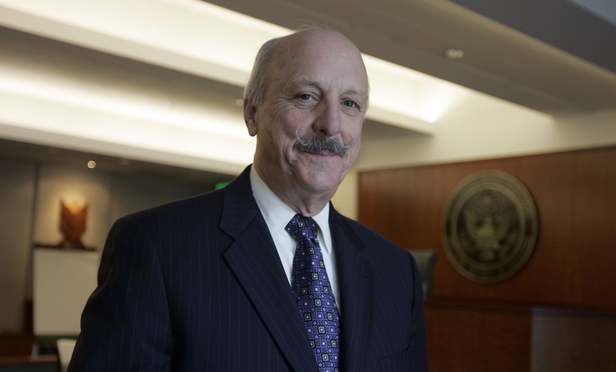Four firms fighting the Heller Ehrman estate over revenue earned by former Heller partners on matters they took with them as the firm collapsed got some bad news last week in the form of a ruling laying out how such so-called unfinished business claims should be calculated.
In a 24-page decision issued Jan. 28, U.S. Bankruptcy Judge Dennis Montali in San Francisco denied an attempt by the firms—Davis Wright Tremaine; Foley & Lardner; Jones Day; and Orrick, Herrington & Sutcliffe—to have clawback suits brought against them by the Heller estate dismissed. In doing so, Montali rejected many of the four firms’ arguments as to why they should not owe the Heller estate any money, including their collective assertion that all the fees earned on the matters in question should qualify as “reasonable compensation” they are entitled to under the Uniform Partnership Act of 1994.
Though Montali also denied partial summary judgment motions filed by Heller in the Jones Day, Davis Wright, and Foley cases, and a summary judgment motion filed by Heller in the Orrick case, a lawyer representing the bankruptcy estate welcomed the judge’s ruling, saying it provides critical clarity with regard to how the dollar amounts the firms may owe should be determined.
Montali said in his decision that each firm bears the burden of showing what portion of the gross fees earned from the unfinished business assignments qualify as “reasonable compensation.” Expenses the firms have tried to put in that category, including recruiter fees, associate training and law firm marketing costs, should not qualify, Montali wrote.
“The only proper offset against unfinished business revenue is the reasonable compensation for the services rendered in winding up the business of Heller,” Montali wrote. He did not provide specifics about how much money is at stake for the four firms or about how each firm proposes breaking down the revenue from the assignments they inherited.
“None of the other cases have addressed in such detail, or any detail, how to actually go about proving the damages,” says Christopher Sullivan, a partner at Greenfield Sullivan Draa & Harrington who represents Heller. “Judge Montali certainly outlined that.”
Unfinished business suits have cropped up in every major law firm bankruptcy over the past decade, from Coudert Brothers to Dewey & LeBoeuf. Most firms that have hired partners from defunct entities have traditionally chosen to settle such cases, which are based largely on precedent established in a 1980s California case, Jewel v. Boxer. On the East Coast, the validity of such claims is currently being considered by New York’s highest appellate court, which was asked by the U.S. Court of Appeals for the Second Circuit to weigh in on the issue.
Howrey trustee Allan Diamond, who is also working on unfinished business claims in the Dewey bankruptcy, said via email that he has “no doubt” Montali’s recent ruling “will provide guidance to parties involved in the Howrey case—and perhaps other law firm bankruptcies,” when it comes to determining unfinished business damages.
Sullivan said more than $8.6 million has been collected so far in the Heller bankruptcy from the 46 other firms that faced unfinished business claims. That money, added to what has been recovered from a variety of other sources, has helped the estate pay the firm’s creditors roughly 56 cents on every dollar they are owed, Sullivan added.
In the Heller bankruptcy, the four remaining unfinished business suits hinge on an earlier ruling by Montali. In that decision, the judge ruled that a waiver signed by the firm’s remaining partners in October 2008, two months before Heller filed for Chapter 11 protection, in an attempt to avoid Jewel claims should be considered a fraudulent transfer. Under law established by the U.S. Court of Appeals for the Ninth Circuit, Heller’s estate must be restored “to the financial condition it would have enjoyed if the transfer had not occurred.”
Montali specified in last week’s ruling that the Heller estate only deserves as much as a firm with financial characteristics comparable to Heller’s would have earned on the matters and not what a firm with significantly higher or lower profit margins would have made. “Otherwise, it would be the beneficiary of an unwarranted benefit,” Montali writes.
Jones Day partner Robert Mittelstaedt says his firm won’t back down in the unfinished business debate. In addition to Heller, Jones Day hired lawyers from Coudert Brothers, which filed for bankruptcy in September 2006; Howrey, which has been in bankruptcy since 2011; and Dewey, which collapsed and sought Chapter 11 protection in 2012.
“We will fight it until we prevail, because of the principle at stake,” Mittelstaedt says. “And the principle is that clients do not belong to law firms. When a law firm goes belly- up because of mismanagement or some other reason, they’re not entitled to revenue or profits that, as the judge found in this case, are due to the efforts and capital of the subsequent law firm.”
This content has been archived. It is available through our partners, LexisNexis® and Bloomberg Law.
To view this content, please continue to their sites.
Not a Lexis Subscriber?
Subscribe Now
Not a Bloomberg Law Subscriber?
Subscribe Now
LexisNexis® and Bloomberg Law are third party online distributors of the broad collection of current and archived versions of ALM's legal news publications. LexisNexis® and Bloomberg Law customers are able to access and use ALM's content, including content from the National Law Journal, The American Lawyer, Legaltech News, The New York Law Journal, and Corporate Counsel, as well as other sources of legal information.
For questions call 1-877-256-2472 or contact us at [email protected]






